How would you rewrite Google's '10 Things?'

content behind a paywall and remove that content from crawling by Google search bots. Is Google doing evil to traditional media publishers like Murdoch, by making their content easily available for free? In August, over at my Oddly Together Website I tackled this topic in post: "Can You Charge for News? Ask Google."
As Google's might increases, it's reasonable to ask how the company's business practices are changing and whether or not it can stick to corporate philosophy "Ten things we know to be true." Perhaps the best known is No. 6: "You can make money without doing evil." But can Google does this? That's the question I pose to Betanews readers.
If Microsoft sites lead time online, pigs can fly
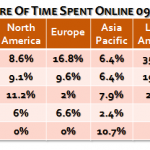
On Friday, ComScore reported that in September, worldwide, Internet users spent more time at Microsoft sites than at Google, Yahoo or even Facebook. It's an amazing statistic that has questionable street cred. ComScore has presented the data in a favorable way to Microsoft but which doesn't accurately represent exactly how Internet users really spend time on popular Websites.
Time-spent-online data is hugely important to Microsoft and other popular destinations, such as Facebook, Google or Yahoo. While bloggers and news organizations obsess over every pageview, time spent online is a much more important metric. People coming and staying for hours is potentially more valuable to online advertisers than Internet users who click in and click out, which too often is the only measurable value of pageviews.
BlackBerry shipments grew five times faster than iPhone in Q3
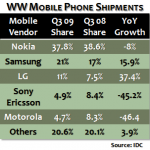
Despite last week's blog and news assertions that iPhone market share had reached 30 percent or even 40 percent, today IDC put Apple's smartphone smack in its place: No. 3, with 17.1 percent worldwide smartphone market share during third quarter. A year earlier, Apple ranked ahead of Research in Motion, which has reclaimed second spot, behind Nokia.
Manufacturers shipped 43.3 million smartphones during third quarter, up 3.2 percent from 41.9 million units in second quarter and up 4.2 percent from 41.5 million units in third quarter 2008. More broadly, manufacturers shipped 287.1 million handsets, up 5.6 percent year over year, according to IDC.
Is there any sense to Microsoft's 800 layoffs?

Today's Microsoft layoffs -- 800 employees -- are surprising. Following the last round, executives seemingly slammed the axe into the chopping block, even though the full number of 5,000 layoffs planned over 18 months hadn't been met.
Late last night, TechFlash first reported that layoffs would be coming today. Microsoft started informing employees today, in what surely has to be an unexpected misfortune. So much time has passed since the last layoffs, the threat of more surely faded. For good reasons. Until these 800 pink slips, there were reasons to be cheerful on the Microsoft campus.
Must Microsoft Store copy Apple Store to succeed?

Over the last 10 days, Microsoft has opened two retail stores, in Arizona and California, and a café in France. Bloggers and journalists largely dismissed the retail outlets as Apple Store knock-offs, which is surprising considering reports of 1,000 or more people lined up for the second opening in Mission Viejo, Calif. That said, the numbers aren't confirmed and a free music concert likely bolstered them.
Over the weekend, ifoAppleStore chronicled the Mission Viejo-store opening -- albeit with some pro-Apple, anti-Microsoft commentary -- and large gallery of photos. From the text and pics, Microsoft Store similarities to Apple Store are obvious.
iPhone cannot win the smartphone wars

I'm going to make a bold prediction: Apple's iPhone will lose the mobile device wars. Such statement will send some iPhone fans howling -- perhaps appropriately so with the full moon days passed and Halloween days away. :)
Put another way: iPhone is to Android -- and somewhat Symbian OS -- handsets as Macintosh was to the DOS/Windows PC in the 1980s and 1990s. The Mac's rocky start in 1984-85 gave way to great success because of several killer applications, with desktop publishing being among the most important. But by the mid 1990s, Windows PCs pushed down Mac market share. The iPhone is poised to track similarly. Gartner predicts that Android OS shipments will exceed iPhone OS by 2012 (see chart). I'm a believer.
Microsoft Q1 2010 by the numbers: Windows license sales at record levels
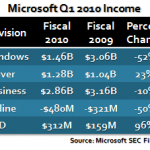
Microsoft may have quite a headache, but the economy finally isn't whacking the company as hard. This morning, Microsoft announced fiscal 2010 first quarter results before Wall Street's opening bell, beating analyst consensus expectations. Mixing metaphors, Microsoft's results don't stink as bad as they have for the last couple of quarters.
Windows 7 is off to a resounding start. Microsoft launched the new operating system yesterday, but PC OEMs have been buying the software for months. During a conference call with financial analysts this morning, Bill Koefoed, general manager of Microsoft investor relations, said that Windows license sales were strongest ever for any single quarter.
Microsoft's 'Have it Your Way' confronts Apple's 'Have it Our Way'
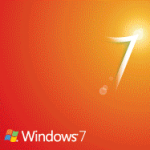
Burger King has long used marketing slogan "Have it Your Way." I saw something different during my first trip to New York City 30 years ago inside the Times Square Burger King. There was an express line with sign: "Have it Our Way." Which line was longer? The one where people could choose how their burgers were fixed.
Today, Microsoft officially launched Windows 7 in New York, emphasizing choice and customer participation. Choice is a longstanding Microsoft marketing and product principle. Participation is a longstanding approach to Microsoft product development. With Windows 7, Microsoft is bringing the two together for the product marketing. Have it your way. "Excuse me, sir. Is that Windows 7 for here or to go?"
The Crook in the Nook: Barnes & Noble ebooks are overpriced compared to Amazon

Yesterday, I excitedly preordered Barnes & Noble's "Nook" ebook reader. Today, I cancelled the order -- and I'm none to happy about it. Why can't Barnes & Noble learn from its past mistakes? The bookseller's digital titles are way overpriced -- at least compared to Amazon (Sony charges even more than both booksellers for many titles).
Quick examples -- and more will come later in this post: Twilight by Stephanie Meyer: $6.59 from Amazon; $8.79 from B&N. Philip K Dick's Do Androids Dream of Electric Sleep?: $8.38 from Amazon; $11.20 from B&N. (Sony charges $9.89 for the first and $9 for the second.)
Apple declares war on the entire PC industry
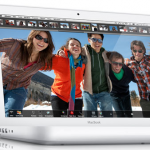
There is absolutely nothing coincidental about Apple launching new products today. The big product launch is Apple's first preemptive marketing strike against Microsoft, Windows 7 and the entire PC industry. It's a bold move exploiting a position of strength against an industry weakened by low-margin, low-priced netbooks.
Windows 7 officially launches in two days. Best Buy already has Windows 7 PCs on sale, but not for purchase. Dell started taking Windows 7 over the weekend. Gartner is telling businesses they must upgrade to Windows 7, despite any hardships migrating from Windows XP. Microsoft is priming the marketing pumps. The PC industry is collectively turning its attention to Windows 7, which Microsoft is trying to launch with some bang rather than a whimper.
Apple Q4 2009 by the numbers: Beats street, posts $1.67B profit

[Editor's Note: Post was updated with quotes from Apple financial analysts conference call and four charts at 6:20 p.m. EDT.]
Today, Apple delivered yet another gravity-defying performance, as sales surged across most product lines. After the bell, the Cupertino, Calif.-based company announced fiscal 2009 fourth quarter results that beat its guidance and Wall Street analysts' over-inflated consensus.
Microsoft sends Danger signal by not taking full responsibility for Sidekick service failure

Microsoft should be lauded for doing what days ago seem miraculous: The recovery of Sidekick service data lost sometime last week. But Microsoft has failed to take responsibility for the data disaster, in statements issued publicly and given to the Los Angeles Times. The company's pass-the-buck position is simply inexcusable. Sole responsibility falls on Microsoft, because Danger is the company's subsidiary.
As Betanews' Scott Fulton reported earlier, Microsoft took credit for the data recovery, but not its loss. A Microsoft spokesperson told the LA Times that "the Danger Service platform, which experienced the outage, is a standalone service operating on non-Microsoft technologies, and is not related to Microsoft's cloud services platform or Windows Live." She continued: "Other and future Microsoft mobile products and services are entirely based on Microsoft technologies and Microsoft's cloud service platform and software."
Mac fanboys should get a life and some Windows 7 common sense

I have to laugh at the sudden, slew of Mac bloggers taking swings at Windows 7 and asserting that Macs will continue to sell well after Microsoft's newest OS ships. Feeling a little defensive are we, bros? Their reaction shows worry that the thing they profess against -- surging PC sales that swamp Macs -- may yet be reality.
Windows 7 is simply Microsoft's best operating system ever. Mac fanboys should worry and circle together in defensive posture. Collectively, they're making a last stand against the PC giant. Please, please, boisterous Mac defenders, stand in the front lines and receive the first blows. You deserve them.
Should you trust Microsoft with your data?

That's probably not a hard question for many Sidekick users to answer, given recent events. If you're a Sidekick user, please offer your answer -- or your experience during the week-long data crisis -- in comments. I ask the same of everyone else. Answer in comments the question: Should you trust Microsoft with your data?
Every existing or potential Microsoft cloud computing customer should ask and answer that question following the Sidekick data loss fiasco. How could Microsoft potentially lose all Sidekick user data? What? There was no server backup? It's not like Microsoft is inexperienced hosting data. The company bought Hotmail over a decade ago. Windows Live is all about hosted data.
I would rather cut bait than be phished in Hotmail's waters

Nagging Capital One credit card commercials ask, "What's in your wallet?" Perhaps for the connected age, the question should be "What's in your digital wallet?" If the answer is a password used at Windows Live Hotmail and pretty much everywhere else online, your wallet may have been stolen.
As reported earlier today by Neowin, on October 1st someone briefly posted online thousands of Hotmail (e.g., Windows Live) account passwords. The number of pilfered accounts could be much higher. The source of the accounts information remains uncertain, although Microsoft claims they were gathered through phishing expeditions. I decided not to wait to find out.
Joe's Bio
Joe Wilcox is BetaNews executive editor. His motto: Change the rules. Joe is a former CNET News staff writer, JupiterResearch senior analyst, and Ziff Davis Enterprise Microsoft Watch editor.
Ethics StatementBetaNews, your source for breaking tech news, reviews, and in-depth reporting since 1998.
© 1998-2025 BetaNews, Inc. All Rights Reserved. About Us - Privacy Policy - Cookie Policy - Sitemap.
